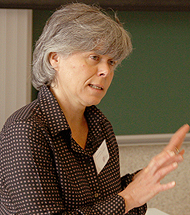Collaborative Economics is not a threat to capitalism, says Italian sociologist
Emanuela Mora recalled in a seminar of the ICS of the University of Navarra that this subject of Economics should contribute "to promote more meaningful relationships between people".

The collaborative Economics does not pose a threat to capitalism," said Italian sociologist Emanuela Mora, professor at the University of Navarra today. Catholic University of the Sacred Heart (Milan). The expert made these declarations at the framework of a seminar organized by the project 'Emotional culture and identity' of the Institute for Culture and Society (ICS), financed by Zurich Insurance.
Although he believed that the two can coexist, he emphasized that "the former often promotes the most radical forms of neoliberal capitalism rather than meaningful relationships between the people involved in such practices". In this sense, he suggested "creating policies that promote it without betraying these principles", alluding to his initial aspiration to "counteract some of the worst effects of capitalism" and "develop fairer economies".
Professor Mora explained that numerous academics who have studied the phenomenon have realized that "most of the people behind the most successful digital platforms related to collaborative Economics have in a short time built large networks, even large companies, and have in their hands most of the profits".
The project 'Emotional culture and identity' of the ICS, financed by Zurich Insurance, organized a seminar on the...
Posted by ICS Unav on Tuesday, May 5, 2015
In this regard, he stressed that this would not be a problem if all the people involved in these practices mediated by such platforms "could obtain benefits in a relaxed and correct way or improve their interpersonal relationships". He emphasized that, on the contrary, "there are still some types of labor exploitation: people without insurance coverage, or whose work times are not specified, or are unprotected. And this happens both with the people who offer services and with those who use them".
As an example, he mentioned the case of some alternative transport platforms: "The cost of car maintenance and passenger insurance is borne by the driver and, as the service is cheaper than other systems, these people have to work long hours to make a profit. It is paradoxical that they seem satisfied to be involved in a flexible but precarious work ".
Emanuela Mora made these statements on the occasion of a seminar on collaborative Economics , practices based on different forms of sharing that often involve people who do not know each other (car sharing, bartering of goods or services, crowdfunding, etc.), but can also constitute an experience of partnership between people who maintain close personal relationships (sustainable purchasing groups, co-working, co-housing...).
In addition to her, the ICS seminar 'Sharing practices, emotional work and emerging effects of sociability' features other experts from various Italian academic centers: the Catholic University of the Sacred Heart, the University of Turin and the University of La Sapienza.
